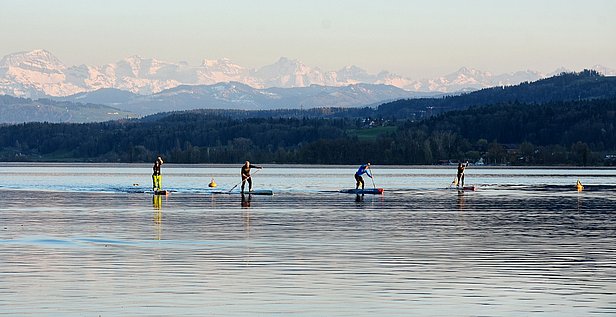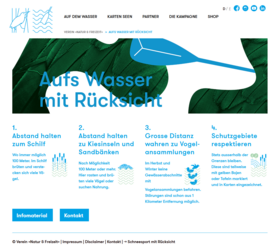28.07.2025 | Lisa Bose | WSL News
Stand-up paddleboarding is booming, but this recreational activity puts a strain on nature. Since 2021, the association ‘Natur & Freizeit’ has been raising awareness among stand-up paddleboarders with its campaign ‘Aufs Wasser mit Rücksicht’ (On the water with respect) to promote behaviour that is compatible with nature and wildlife. An evaluation of the campaign on Lake Greifensee by the Swiss Federal Research Institute WSL now shows that people who are aware of the campaign behave more considerately. There is still a particular need for action among newcomers to the sport.
- The ‘Aufs Wasser mit Rücksicht’ (On the water with respect) campaign is working. People who are familiar with the campaign and its message behave more considerately towards nature when out on their SUP boards.
- A good third of stand-up paddlers on Lake Greifensee are familiar with the campaign – a success given the limited resources available. There is a particular need for action among SUP novices.
- To increase its impact, the campaign should focus more on social media and multipliers.
Stand-up paddleboarding, or SUP for short, is popular in Switzerland across all age groups. Especially on the busy Greifensee lake in the canton of Zurich, it is now impossible to imagine the water without people paddling upright. But the more paddlers there are, the greater the pressure on nature. The activities disturb water birds in particular, for example during the breeding season. Since 2021, the ‘Natur & Freizeit’ association has been raising awareness among paddlers with its ‘Aufs Wasser mit Rücksicht’ (On the water with respect) campaign at a total of 11 lakes in Switzerland, promoting nature-friendly behaviour on SUP boards. Paddlers should, for example, keep their distance from reeds, observe protected areas and avoid gatherings of water birds.
What impact has the campaign had so far? The association commissioned WSL to conduct an evaluation, which interviewed SUP paddlers on Lake Greifensee. The results show that awareness of the campaign increased between 2021 and 2024 and has now reached 36%. And above all, those who are aware of the ‘Aufs Wasser mit Rücksicht’ campaign behave in a more environmentally conscious manner. In 2024, stand-up paddlers reported significantly more often than in 2021 that they frequently or always kept a distance of more than 25 metres from the reed beds and stayed outside protected areas. In fact, rule violations such as entering protected zones such as reed beds on Lake Greifensee have decreased. ‘The campaign is effective – provided it is noticed,’ says WSL geographer Selina Gattiker, who carried out the evaluation.
Room for improvement ¶
So far, a third of those surveyed are aware of the campaign. ‘That's a good result, considering the limited resources available,’ explains Gattiker. Rangers and the campaign team working at the lakes distribute flyers at Lake Greifensee, and information boards and posters at the entry points remind paddlers to behave in an environmentally friendly manner. The campaign is also visible on the internet and on social media.
Experienced stand-up paddlers in particular will demonstrate a significantly higher level of practical knowledge and environmentally friendly behaviour in 2024 than at the start of the campaign. Gattiker says that there is still room for improvement among newcomers to SUP. One possibility would be to work with major retailers to provide customers with targeted information and raise awareness when they purchase a board.
To further increase the impact of the campaign, the researcher recommends greater involvement of multipliers in the future, for example through collaborations with influencers on social media. Although the Natur & Freizeit association expanded its social media presence during the study period and thus increased its reach, it still reached relatively few stand-up paddlers via these channels in 2024, contrary to expectations. At the same time, raising awareness among paddlers directly on site remains important, explains Gattiker. This is particularly important because paddlers usually navigate locally using signs, boards and buoys.
‘The campaign is definitely on the right track. It shows that raising awareness is having an effect and that bans are not always necessary,’ says Gattiker. However, it will take a lot of patience before all paddlers know how to behave correctly on the board – and actually do so.
Kontakte ¶
- Selina Gattiker, Social Landscape Research WSL
selina.gattiker(at)wsl.ch
+41 44 739 2872 - Marcel Hunziker, Group Leader Social Landscape Research WSL
marcel.hunziker@wsl.ch
+41 44 739 2459 - Reto Solèr, Managing Director, Nature & Leisure Association
reto.soler(at)natur-freizeit.ch
+41 79 628 16 03
WSL publication ¶
Copyright ¶
WSL and SLF provide image and sound material free of charge for use in the context of press contributions in connection with this media release. The transfer of this material to image, sound and/or video databases and the sale of the material by third parties are not permitted.


